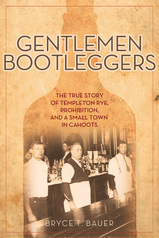 Summer reading is a relative term. Some want to spend an afternoon in the sun with a romance novel. Others prefer diving into the history of Iowa bootlegging. For those who join me in the second category, I just got to spend 235 pages with the original distillers of Templeton rye in the book Gentlemen Bootleggers, by Bryce T. Bauer. This is old-school Prohibition Templeton rye and not the alcohol currently made under that name. Despite impressive marketing (and a nice flavor), the current Templeton Rye is distilled in Lawrenceburg, Indiana. But there was an original Templeton rye straight out of Templeton, Iowa. And talk about community spirit. Who wouldn’t want to live in town where the church makes liquor in the basement and most sheds probably contain a still? I know what we usually think – Prohibition? Crazy. Dumb idea. But bootlegger? Bad, right? Chicago mobsters with violin cases full of Tommy guns. The average family farmer or hardware store owner probably doesn’t come to mind.
And that’s what this book highlights: that a lot of regular people were against Prohibition and didn’t think the government should dictate what people were allowed to drink. I’m just going to go ahead and assume if you are reading this that you would be a Wet, not a Dry. In a city, you might go to a speakeasy to find some whiskey. But in rural towns, many people took to making their own, drawing on a long tradition of independent distilling in the US. In the case of Templeton, practically an entire town joined in the resistance of national law. Developing a brand name when an entire industry is illegal is difficult, but Templeton whiskey sounds like it was good enough to make a name for itself. And it certainly caught the attention of those who dedicated their life to the useless goal of rooting out alcohol. With this book, you have to be willing to settle down and learn something. It goes back to the origins of Prohibition that started as a states’ issue, not a national law, fueled by a creepy anti-immigrant, anti-saloon tinge. Religious zealots and mob justice factored in. The Depression was a major player at the end. This book is about the rise and fall of a movement – Prohibition – as well as the rise of an industry – bootlegging – which eventually goes obsolete. It’s the people trying to be good and follow the law constantly getting foiled by a system of people trying to skirt the law. And, holding a glass of whiskey in one hand and the book in the other, I have to admit I wasn’t cheering for the “good” guys. Along the way, you get the characters. The mayor so proud of his town that he puts the brown jug symbol into their public Christmas decorations as “holiday spirits.” The former sheriff so intent on weeding out alcohol that he takes a pay cut to become a federal Prohibition agent. The fired up preacher who whips the masses into a fury over the ills of alcohol and assures them once Prohibition takes effect: “Men will walk upright, women will smile, and children will laugh.” (As a woman, I can assure you that the inability to obtain liquor would not make me smile, but I’m probably not of the proper ladyfolk he is thinking of.) And the local entrepreneur bootlegger who pulls an entire town into a loyal pact: get caught, we pay your bail; plead guilty, we pay the fine, but no one names names. Bauer weaves the people into the history facts and fleshes out scenes that add flavor to what everyday life in a dry world would be, often adding descriptions from local papers, including this fun description of a bachelor party after Prohibition takes effect: “The party staged an orgy of cottage and cream cheese, soda pop, almost-beer, squash pie and other modern versions of the cup that satisfies but furnishes no inspiration for either mental or physical acrobatics.” If you wonder how Prohibition came about, if you wonder about how it played out in small towns and not just the cities, and if you wonder which role you would have played, I think this book brings a fresh perspective. I remember learning my great-aunt had been a “flapper” in North Dakota. She came from a large Norwegian, Lutheran family that made their living on a farm in the middle of nowhere. How scandalous that this 80-something-year-old women I knew wore a cute, beaded gown when she was young and maybe tasted a local drink at a barn dance. But how scandalous was it, really? Don’t we hope we would do the same? And if we did, wouldn’t we want to live in a loyal town that wouldn’t rat us out and also happened to make some decent tasting whiskey? Comments are closed.
|
Archives
November 2017
|

 RSS Feed
RSS Feed
